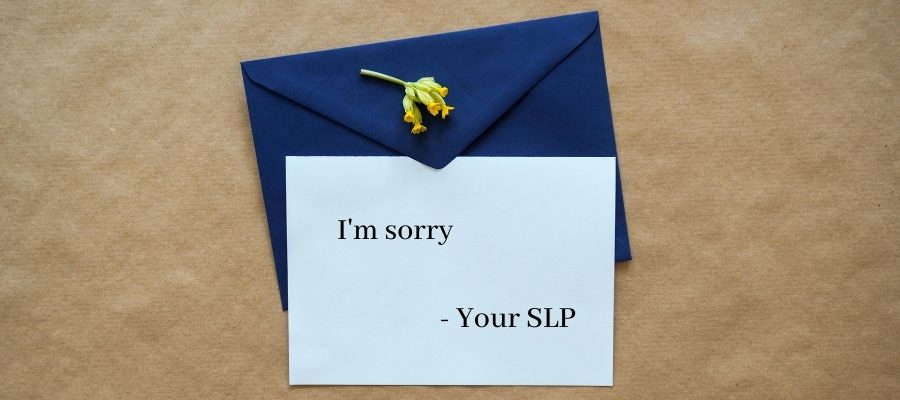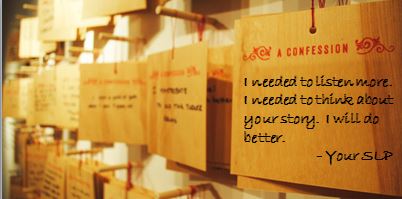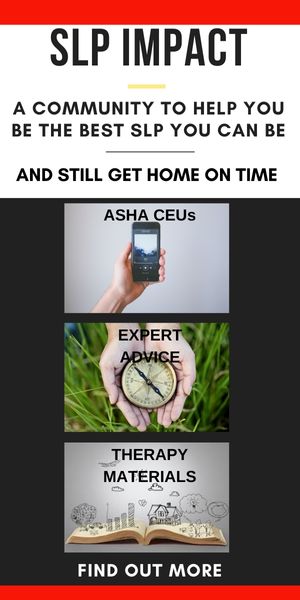Twelve years ago, I was ready to dive into the world of speech-language pathology with enthusiasm, fervor and a toolkit of assessment and therapy materials. I had worked hard in the cold and snowy deciduous forests of Madison, Wisconsin to earn my degree. At the time, it was the best graduate program for our field, and I was going to be the best. Don’t get me wrong—I am the first to say that there are others much smarter and better than me. Rather, I felt like I needed to be the best speech-language pathologist because every child, every client deserved that. So, in 2003, I embarked on my profession. My brain knew how to give assessments, write reports and give parents lists of effective text-book strategies for any speech and language disorder.

I was confident my well-earned GPA and handful of clinical experiences gave me the solid foundation I needed. And, I was very wrong.
Fast-forward to 2015 and I will say that I walk into each assessment and therapy with less book knowledge. I continually think to myself, “There’s so much information out there. I have so much more learning to do. There are stacks of research journals on my nightstand used as coasters.” When parents ask questions, I rely on my experiences to give my response. Then, I will usually follow-up with, “But there is no one else like your child. So, we need to meet his unique and important needs. Together, we’ll find a way.” My brain’s work is now supplemented by the sentiments of my heart-skills: flexibility, acknowledgement and empathy for the challenges of being parent. So, today, I wanted to take the time to sincerely apologize to the parents and families of a decade ago. This is my confession as a speech-language pathologist.
Dear Awesome Families,
Thank you so much for allowing me to be a part of your family’s journey. I want to take this opportunity to say, “I’m sorry.” When I walked into the room to give your son the speech test, I did not take the time to talk to you—what keeps you up at night as his mama? I did not hear your story about what was most important to you as a parent. Before giving him a test, we should have talked about what he liked, what frustrated him, what he excelled at. I only looked at one aspect of your son, and there are so many more wonderful parts to him. You know his story best, and I should have listened.
Then, when he did qualify for speech services, I talked about the numbers, the scores. I used big words that I did not learn until graduate school. I kept my eye on the clock to make sure that I would make my next therapy session, and I only gave you four minutes to ask important questions (that you likely stayed up late thinking about). I should have talked to you before our meeting—formal meetings are not a good time to hear news for the first time. I should have given you ample time to talk about your concerns because you deserve that as the parent. As a parent of two young children (and one on the way), I now understand this. I should have spoken to you like a human being. Words are important to me as an SLP; however, I am the first to say that the most important words are not necessarily the longest.
When he showed up for the first day of our speech session, I told you to say good-bye to your 3-year-old at the front of the school building. He cried, and I noticed your eyes beginning to water. I said, “He’ll be okay,” and walked into the big building. He stopped crying when I showed him the puppet I used for therapy. He made his first /k/ sound, and I was happy. After the session, I walked him down the long hallway, through the front doors and back to your car. You seemed relieved, and he was excited to show you the sticker he received. I said, “He made his first /k/ sound!” and you appeared pleased. I should have invited you to be a part of our session. I wish you could have been there to hear his first /k/ sound, see the strategies I used and possibly try out his new skills at home. Please know that I learned from you and your son. Now, I try my best to have parents see the therapy session. Sometimes, it’s a video sent on the phone. Sometimes, if possible, my parents stay for the entire session. Parents, like you, should be a big part of the therapy process, and I now know this.
Thank you for being a part of my learning journey. Much like my students and clients, I am slowly growing and finding ways to be better. Please know that my time with you was meaningful. Thank you so much.
Sincerely,
Your Speech-Language Pathologist





My brother was having a hard time talking and my parents wanted to make sure that he’ll get better. It was discussed here that it will be best to have parents at the therapy session. Furthermore, it’s recommended to hire a speech-language pathologist for quality services.
I thought that it made sense when you explained that one thing to consider when you are working with a speech pathologist is to make sure that there are good communication and understanding between the professional and the family in order to convey needs. I have been thinking about enrolling my daughter in speech therapy classes but I have been worried that she would not receive the help and attention that she is in need of. I will be sure to read reviews and ratings online to find a reputable professional that will communicate well with family and offer the appropriate attention that my daughter deserves.
Ashley,
Communication between the SLP and family is surely key to your daughter’s communication journey. As the parent, you have the lifespan perspective. We have the speech-language pathology brain. When these two forces are united, outcomes are maximized.